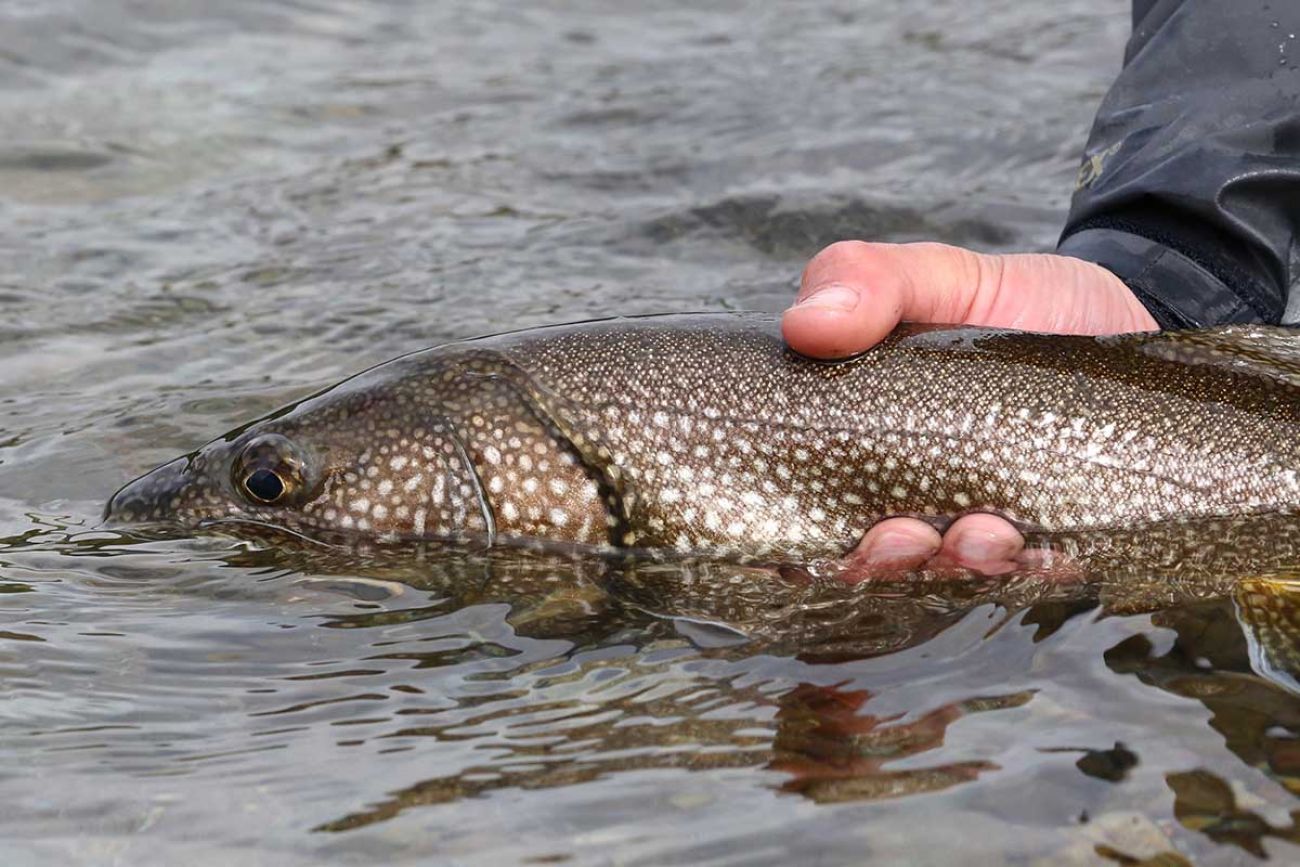Daily trout limits in Lake Huron may be reduced due to overfishing

April 14: Michigan scraps special elk hunt in January
Michigan anglers caught too many lake trout and splake in northern Lake Huron last year, which could mean a reduced catch limit this season.
The state Department of Natural Resources is recommending the Natural Resource Commission reduce the daily catch limit for lake trout and splake from three to two fish because recreational anglers exceeded limits spelled out in the 2000 Great Lakes Consent Decree with state tribes.
The NRC will consider the recommendation Thursday.
Related:
- All eyes on Grand Traverse Bay as deadline looms for tribal fishing decree
- DNR announces fishing regulations for Michigan’s 2022 season
The consent decree is an agreement that governs state and tribal fisheries spelled out in the 1836 Treaty of Washington, which ceded more than 13 million acres of Native American land in northern Michigan and enshrined fishing rights of the Grand Traverse Band, the Bay Mills Indian Community, the Little Traverse Bay Band of Odawa Indians, the Sault Tribe of Chippewa Indians and the Little River Band of Ottawa Indians.
The deal gives tribes 88 percent of the lake trout population in northern Lake Huron and 12 percent to non-tribal anglers. The ratio is reversed on the southern end of the lake: tribes get 5 percent of the trout, while state-licensed anglers get 95 percent.
The deal calls for penalties if either party overfishes — and last year, state anglers exceeded their quota by 21 percent in northern Lake Huron, reeling in 68,518 lake trout, above the 56,782 limit.
That’s partly because declining salmon populations are driving more anglers to target trout, experts said.
“The lake trout is available year-round for the charter fishing industry,” said Eric Andersen, former president of the Michigan Charter Boat Association and current member of the Lake Huron Citizen Fisher Advisory Council.
“You're taking people out on a charter and the people want to catch fish. They don’t have to catch salmon, they just want to catch fish, so you target lake trout.”
Tom Corenflo, the biological services director for the Chippewa Ottawa Resource Authority, said tribes have not received the state’s plan to reduce its lake trout catch in northern Lake Huron but they should be able to review it by the end of April.
The consent decree expired in August 2020 but the COVID-19 pandemic delayed negotiations. The state and tribes are currently negotiating the terms and limits of a new agreement.
Randy Claramunt, the DNR Lake Huron basin coordinator, said the consent decree is meant to set quotas that try to promote a balanced fishery. When the consent decree was established, Claramunt said the lake trout allocation was set at a low amount because the salmon fishery was strong.
Generally, anglers prefer to fish salmon over lake trout because they’re tastier.
“Every few years, we go over our lake trout harvest in the northern region because salmon aren’t readily available,” Claramunt said.
Claramunt said state anglers also exceeded the consent decree’s northern Lake Huron’s lake trout limit by 28 percent in 2018. After triggering the penalty, the NRC reduced the catch limit from three to two in 2019 and met its harvest limit requirements.
When the consent decree’s catch limit was met, the NRC increased the lake trout catch limit in Lake Huron back to three per day. Claramunt said the DNR didn’t recommend keeping the daily limit to two because anglers' effort wasn’t as high as it is today.
“The effort was gradually declining but then when COVID hit, it jumped back up,” Claramunt said. “A lot of people saw outdoor recreation as a healthy choice during the pandemic.”
Claramunt said reducing the daily catch limit is the easiest way to return to compliance with the 2000 consent decree. Fishing regulations are broken into three categories: catch limits, size limits and seasons.
According to Claramunt, if the NRC tries to reduce lake trout harvest by raising the size limit, the state could still exceed the consent decree’s catch limit.
Because lake trout are a deep, cold-water fish, if an angler hooks a small one and releases it back into the water because it doesn’t meet a new size limit, that fish is likely to die in the warm, shallow water.
“We have to estimate and account for the released fish that die in our quota. So, size limits are not very effective when you’re managing an allocation,” Claramunt said.
According to the DNR, monthly closures are also ineffective unless they happen during the peak angling seasons, which severely reduces angler opportunities.
Moreso, the DNR believes seasonally differing regulations for a fishery can complicate enforcement efforts.
Another option the NRC has to ensure the consent decree’s requirements are met is reducing the lake trout and splake bag limits from three to one fish.
The DNR does not prefer this option because such a change would severely limit the opportunity of state recreational fishers. Claramunt said angler effort is already likely to decrease because of high gas prices, which is needed to fuel boats.
“A one fish limit is pretty excessive and is almost essentially viewed by a lot of our anglers as shutting down the fishery,” Claramunt said.
The Lake Huron Citizen Fishery Advisory Council also does not want the commission to reduce the lake trout and splake catch limit from three to one but does support a reduction to two fish per day.
“The charter captains could lose some of that revenue or customers because it isn’t worth them going out on a big lake for so little fish,” said Andersen of the charter boat group.
Michigan Environment Watch
Michigan Environment Watch examines how public policy, industry, and other factors interact with the state’s trove of natural resources.
- See full coverage
- Subscribe
- Share tips and questions with Bridge environment reporter Kelly House
Michigan Environment Watch is made possible by generous financial support from:
Our generous Environment Watch underwriters encourage Bridge Michigan readers to also support civic journalism by becoming Bridge members. Please consider joining today.
See what new members are saying about why they donated to Bridge Michigan:
- “In order for this information to be accurate and unbiased it must be underwritten by its readers, not by special interests.” - Larry S.
- “Not many other media sources report on the topics Bridge does.” - Susan B.
- “Your journalism is outstanding and rare these days.” - Mark S.
If you want to ensure the future of nonpartisan, nonprofit Michigan journalism, please become a member today. You, too, will be asked why you donated and maybe we'll feature your quote next time!






